共享经济外文翻译文献编辑
共享经济英语作文
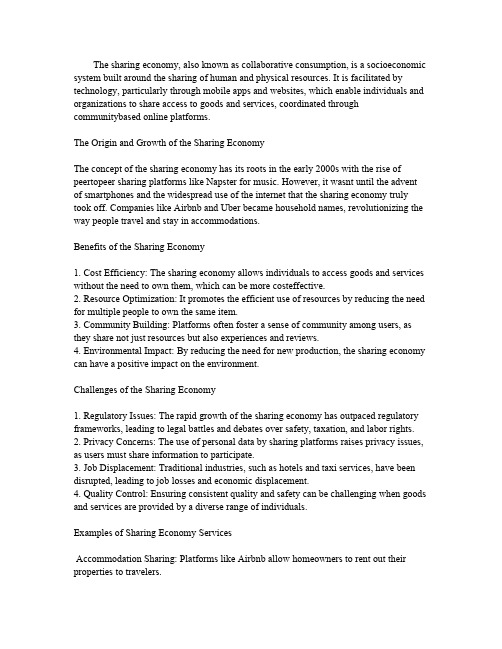
The sharing economy,also known as collaborative consumption,is a socioeconomic system built around the sharing of human and physical resources.It is facilitated by technology,particularly through mobile apps and websites,which enable individuals and organizations to share access to goods and services,coordinated through communitybased online platforms.The Origin and Growth of the Sharing EconomyThe concept of the sharing economy has its roots in the early2000s with the rise of peertopeer sharing platforms like Napster for music.However,it wasnt until the advent of smartphones and the widespread use of the internet that the sharing economy truly took panies like Airbnb and Uber became household names,revolutionizing the way people travel and stay in accommodations.Benefits of the Sharing Economy1.Cost Efficiency:The sharing economy allows individuals to access goods and services without the need to own them,which can be more costeffective.2.Resource Optimization:It promotes the efficient use of resources by reducing the need for multiple people to own the same item.munity Building:Platforms often foster a sense of community among users,as they share not just resources but also experiences and reviews.4.Environmental Impact:By reducing the need for new production,the sharing economy can have a positive impact on the environment.Challenges of the Sharing Economy1.Regulatory Issues:The rapid growth of the sharing economy has outpaced regulatory frameworks,leading to legal battles and debates over safety,taxation,and labor rights.2.Privacy Concerns:The use of personal data by sharing platforms raises privacy issues, as users must share information to participate.3.Job Displacement:Traditional industries,such as hotels and taxi services,have been disrupted,leading to job losses and economic displacement.4.Quality Control:Ensuring consistent quality and safety can be challenging when goods and services are provided by a diverse range of individuals.Examples of Sharing Economy ServicesAccommodation Sharing:Platforms like Airbnb allow homeowners to rent out their properties to travelers.RideSharing:Companies like Uber and Lyft provide transportation services where drivers use their own vehicles.Car Sharing:Services such as Zipcar allow users to rent cars for short periods.Task Services:Platforms like TaskRabbit connect people who need help with tasks to individuals willing to perform them for a fee.The Future of the Sharing EconomyAs technology continues to advance,the sharing economy is likely to expand into new areas,such as coworking spaces,shared meal services,and even shared experiences like attending concerts or sporting events.However,its future success will depend on how well it can address the challenges it faces,including regulatory compliance,user trust, and social acceptance.In conclusion,the sharing economy represents a significant shift in how we view ownership and access to goods and services.It offers numerous benefits but also presents challenges that must be navigated carefully to ensure its sustainable growth and positive impact on society.。
共享经济 的英文作文
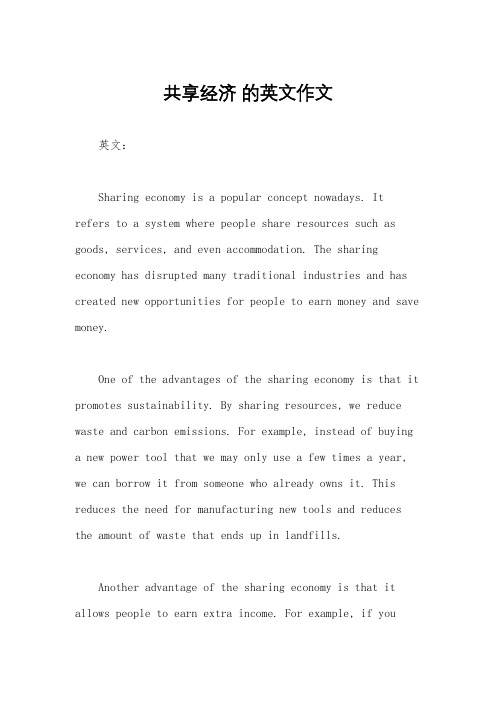
共享经济的英文作文英文:Sharing economy is a popular concept nowadays. Itrefers to a system where people share resources such as goods, services, and even accommodation. The sharing economy has disrupted many traditional industries and has created new opportunities for people to earn money and save money.One of the advantages of the sharing economy is that it promotes sustainability. By sharing resources, we reduce waste and carbon emissions. For example, instead of buying a new power tool that we may only use a few times a year, we can borrow it from someone who already owns it. This reduces the need for manufacturing new tools and reduces the amount of waste that ends up in landfills.Another advantage of the sharing economy is that it allows people to earn extra income. For example, if youhave a spare room in your house, you can rent it out on Airbnb and make some extra money. Similarly, if you have a car that you don't use very often, you can rent it out on Turo and make some extra money. This can be especially helpful for people who are struggling to make ends meet.However, there are also some disadvantages to the sharing economy. For example, it can be difficult to regulate. Because many sharing economy platforms are relatively new, there are often gaps in the laws and regulations that govern them. This can lead to issues such as safety concerns and unfair competition.Overall, I think that the sharing economy has the potential to be a positive force in our society. It can help us to be more sustainable and can provide new opportunities for people to earn money. However, we need to be careful to ensure that it is regulated in a way that is fair and safe for everyone involved.中文:共享经济是一个现在非常流行的概念。
共享经济英文议论文作文

共享经济英文议论文作文Shared economy, also known as collaborative consumption, is a trend that allows individuals to rent or borrow goods and services rather than buying them outright. It hasgained popularity in recent years due to its cost-saving benefits and environmental advantages.One of the key benefits of the shared economy is its ability to reduce waste and promote sustainability. By allowing people to share resources, such as cars or housing, the shared economy helps to minimize the environmental impact of overconsumption.In addition to its environmental benefits, the shared economy also offers financial advantages. By sharing goods and services with others, individuals can save money on purchases and reduce their overall expenses.However, there are also some drawbacks to the shared economy. One concern is the lack of regulation andoversight, which can lead to issues such as safety concerns or disputes between users.Despite these challenges, the shared economy continuesto grow and evolve, with new platforms and services constantly emerging to meet the changing needs of consumers. As technology advances and society becomes more interconnected, the shared economy is likely to play an increasingly important role in how we live and work.。
共享经济的英语作文
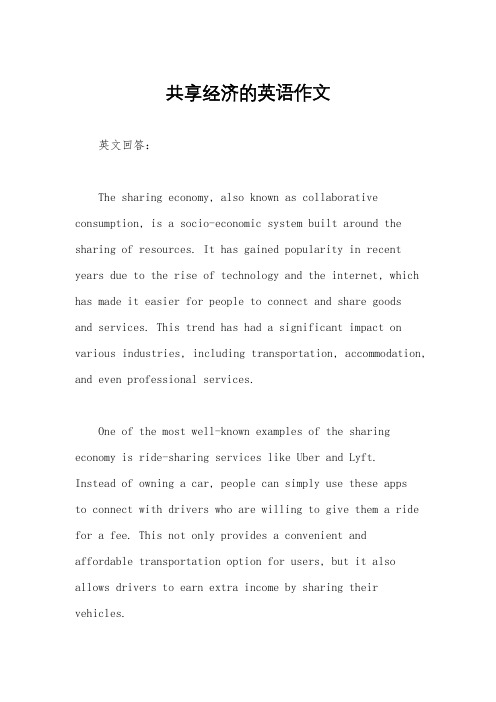
共享经济的英语作文英文回答:The sharing economy, also known as collaborative consumption, is a socio-economic system built around the sharing of resources. It has gained popularity in recent years due to the rise of technology and the internet, which has made it easier for people to connect and share goodsand services. This trend has had a significant impact on various industries, including transportation, accommodation, and even professional services.One of the most well-known examples of the sharing economy is ride-sharing services like Uber and Lyft.Instead of owning a car, people can simply use these appsto connect with drivers who are willing to give them a ride for a fee. This not only provides a convenient andaffordable transportation option for users, but it also allows drivers to earn extra income by sharing their vehicles.Another example is Airbnb, a platform that allows people to rent out their homes or spare rooms to travelers. This has disrupted the traditional hotel industry and provided travelers with more affordable and unique accommodation options. I personally have used Airbnb several times and have had great experiences staying in local homes and interacting with the hosts.In terms of professional services, platforms like TaskRabbit and Upwork allow individuals to offer their skills and services to others on a freelance basis. This has created new opportunities for people to earn money by sharing their expertise in areas such as graphic design, writing, and programming.The sharing economy has also had a positive impact on sustainability and the environment. By sharing resources, we are able to reduce waste and consumption, which is beneficial for the planet. For example, car-sharing services can help reduce the number of cars on the road, leading to less traffic and lower carbon emissions.中文回答:共享经济,也称为协作消费,是建立在资源共享基础上的社会经济体系。
共享经济作文 英文

共享经济作文英文英文:Sharing economy is a new trend in the world of business. It is a type of economy where individuals share their resources with others, usually through online platforms. This type of economy has been growing in popularity in recent years due to its many benefits.One of the benefits of sharing economy is that it is cost-effective. For example, instead of buying a car, I can use a car-sharing service to rent a car when I need it.This saves me money on car payments, insurance, and maintenance. Another benefit is that it promotes sustainability. By sharing resources, we can reduce waste and conserve natural resources.However, there are also some challenges to sharing economy. One challenge is that it can be difficult to regulate. Since sharing economy is often based on peer-to-peer transactions, it can be hard to ensure that allparties are following the rules. Another challenge is thatit can lead to job loss in certain industries. For example, if people start sharing cars instead of buying them, it could lead to a decrease in car sales and job losses in the automotive industry.Overall, I believe that sharing economy is a positive trend. It has the potential to save people money, promote sustainability, and foster a sense of community. However,it is important to address the challenges and ensure that sharing economy is regulated in a fair and effective manner.中文:共享经济是商业世界中的一种新趋势。
共享经济的英语作文
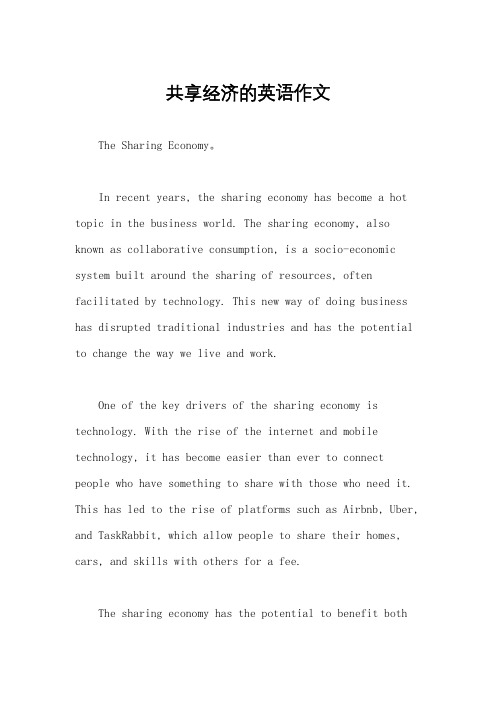
共享经济的英语作文The Sharing Economy。
In recent years, the sharing economy has become a hot topic in the business world. The sharing economy, also known as collaborative consumption, is a socio-economic system built around the sharing of resources, often facilitated by technology. This new way of doing business has disrupted traditional industries and has the potential to change the way we live and work.One of the key drivers of the sharing economy is technology. With the rise of the internet and mobile technology, it has become easier than ever to connect people who have something to share with those who need it. This has led to the rise of platforms such as Airbnb, Uber, and TaskRabbit, which allow people to share their homes, cars, and skills with others for a fee.The sharing economy has the potential to benefit bothconsumers and businesses. For consumers, it offers a more affordable and convenient way to access goods and services. For businesses, it provides a new revenue stream and the opportunity to reach a wider audience. In addition, the sharing economy can also have positive environmental impacts by reducing waste and promoting the efficient use of resources.However, the sharing economy also presents challenges and risks. One of the main concerns is the lack of regulation and oversight, which can lead to issues such as safety concerns and unfair competition. In addition, there are also concerns about the impact of the sharing economy on traditional industries and the potential for job displacement.Despite these challenges, the sharing economy is here to stay. As technology continues to advance and consumer attitudes towards ownership and consumption change, the sharing economy will only continue to grow. It is up to businesses, policymakers, and consumers to work together to ensure that the sharing economy is sustainable andbeneficial for all.In conclusion, the sharing economy is a new and exciting development that has the potential to change the way we live and work. While it presents challenges and risks, it also offers numerous benefits for consumers, businesses, and the environment. As the sharing economy continues to evolve, it is important for all stakeholders to work together to ensure that it is a force for good in the world.。
共享经济英语作文短篇范文
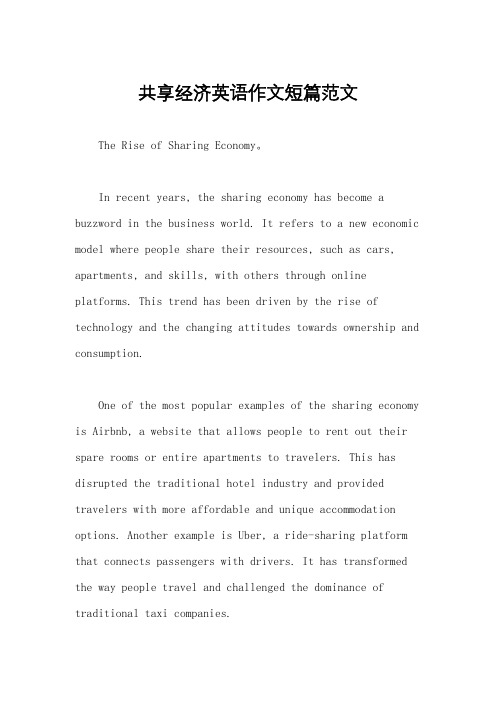
共享经济英语作文短篇范文The Rise of Sharing Economy。
In recent years, the sharing economy has become a buzzword in the business world. It refers to a new economic model where people share their resources, such as cars, apartments, and skills, with others through online platforms. This trend has been driven by the rise of technology and the changing attitudes towards ownership and consumption.One of the most popular examples of the sharing economy is Airbnb, a website that allows people to rent out their spare rooms or entire apartments to travelers. This has disrupted the traditional hotel industry and provided travelers with more affordable and unique accommodation options. Another example is Uber, a ride-sharing platform that connects passengers with drivers. It has transformed the way people travel and challenged the dominance of traditional taxi companies.The sharing economy has also created new opportunities for people to earn extra income and start their own businesses. For example, someone with a spare room can become a host on Airbnb and earn money by renting it out to travelers. Similarly, someone with a car can become adriver on Uber and earn money by providing rides to passengers.However, the sharing economy has also raised concerns about safety, regulation, and the impact on traditional industries. For example, some people have raised concerns about the safety of using services like Airbnb and Uber, as they are not subject to the same regulations and inspections as traditional hotels and taxis. Others have raised concerns about the impact on jobs and the economy, as the sharing economy may lead to the displacement of workers in traditional industries.In conclusion, the sharing economy is a new andexciting development in the business world. It has the potential to provide people with more affordable andflexible services, while also creating new opportunities for entrepreneurship and innovation. However, it is important to address the concerns and challenges that come with this new economic model to ensure that it benefits everyone involved.。
共享经济英文作文
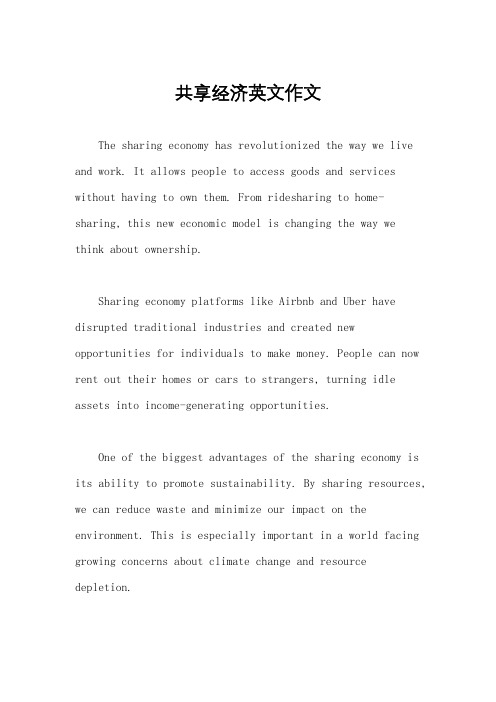
共享经济英文作文The sharing economy has revolutionized the way we live and work. It allows people to access goods and services without having to own them. From ridesharing to home-sharing, this new economic model is changing the way wethink about ownership.Sharing economy platforms like Airbnb and Uber have disrupted traditional industries and created new opportunities for individuals to make money. People can now rent out their homes or cars to strangers, turning idle assets into income-generating opportunities.One of the biggest advantages of the sharing economy is its ability to promote sustainability. By sharing resources, we can reduce waste and minimize our impact on the environment. This is especially important in a world facing growing concerns about climate change and resource depletion.The sharing economy also promotes a sense of community and connection among individuals. By sharing goods and services with others, we can build relationships and foster a sense of trust and cooperation. This can help strengthen social bonds and create a more inclusive society.However, the sharing economy is not without its challenges. Issues like safety, privacy, and regulation have all been raised as potential concerns. As the sharing economy continues to grow, it will be important for companies and policymakers to address these issues and ensure that users are protected.Overall, the sharing economy has the potential to create a more efficient, sustainable, and connected world. By embracing this new economic model, we can unlock new opportunities for innovation and collaboration. As we move forward, it will be important to strike a balance between the benefits of sharing and the need for regulation and oversight.。
共享经济英语范文
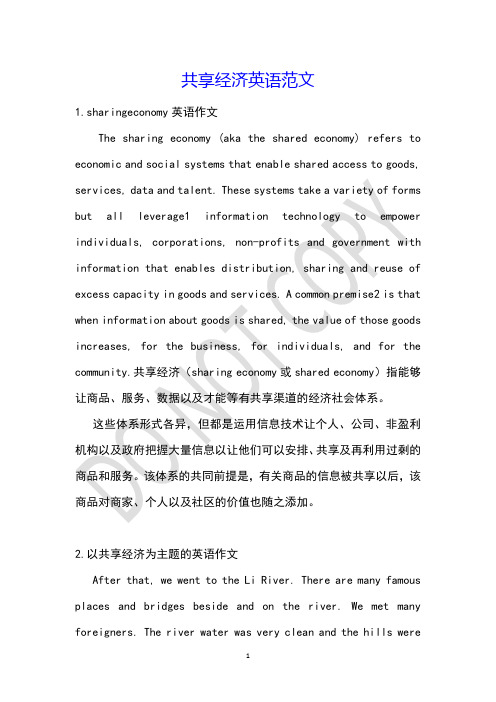
共享经济英语范文1.sharingeconomy英语作文The sharing economy (aka the shared economy) refers to economic and social systems that enable shared access to goods, services, data and talent. These systems take a variety of forms but all leverage1 information technology to empower individuals, corporations, non-profits and government with information that enables distribution, sharing and reuse of excess capacity in goods and services. A common premise2 is that when information about goods is shared, the value of those goods increases, for the business, for individuals, and for the community.共享经济(sharing economy或shared economy)指能够让商品、服务、数据以及才能等有共享渠道的经济社会体系。
这些体系形式各异,但都是运用信息技术让个人、公司、非盈利机构以及政府把握大量信息以让他们可以安排、共享及再利用过剩的商品和服务。
该体系的共同前提是,有关商品的信息被共享以后,该商品对商家、个人以及社区的价值也随之添加。
2.以共享经济为主题的英语作文After that, we went to the Li River. There are many famous places and bridges beside and on the river. We met many foreigners. The river water was very clean and the hills weregreen. It looks like a wonderful picture. We stayed beside the Li River for a long time, feeling very happy.When we felt tired, we took the bus back home. What a wonderful time We had!3.求一篇英语作文sharinghappinessLearning to share is a process to learn how to lead a happy life.I am used to sharing my secrets and favourite things with my friends in order to let my heart free and make me thoroughly 彻底地 forget sadness.When I am happy,I will share my smile with my friends,which brightens up all the faces around me.When I am sad,I will also share my sorrow with them.There seems to be a stream flowing in my heart,clearing up my pain.I gain happiness which is from not only myself but also others by sharing.As the saying goes,“Sharing is a wonderful thing which can increase the pleasure and reduce sadness.” I believe sharing will be a resource of happiness if I can insist on doing so.。
共享经济英语作文轮廓
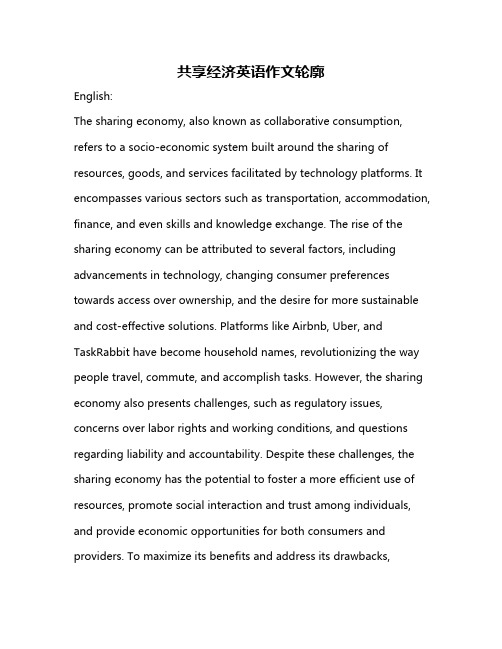
共享经济英语作文轮廓English:The sharing economy, also known as collaborative consumption, refers to a socio-economic system built around the sharing of resources, goods, and services facilitated by technology platforms. It encompasses various sectors such as transportation, accommodation, finance, and even skills and knowledge exchange. The rise of the sharing economy can be attributed to several factors, including advancements in technology, changing consumer preferences towards access over ownership, and the desire for more sustainable and cost-effective solutions. Platforms like Airbnb, Uber, and TaskRabbit have become household names, revolutionizing the way people travel, commute, and accomplish tasks. However, the sharing economy also presents challenges, such as regulatory issues, concerns over labor rights and working conditions, and questions regarding liability and accountability. Despite these challenges, the sharing economy has the potential to foster a more efficient use of resources, promote social interaction and trust among individuals, and provide economic opportunities for both consumers and providers. To maximize its benefits and address its drawbacks,policymakers, businesses, and stakeholders need to collaborate to develop appropriate regulations, ensure fair labor practices, and foster innovation in the sharing economy ecosystem.中文翻译:共享经济,也称为协作消费,是一个建立在技术平台上的资源、商品和服务共享的社会经济体系。
共享经济的英语作文
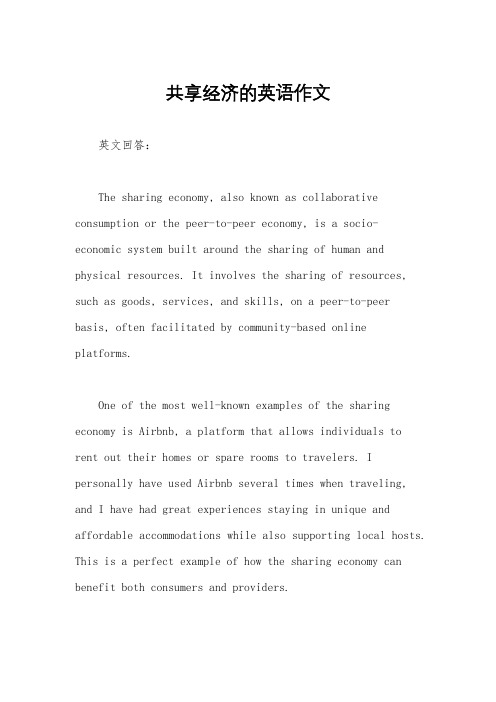
共享经济的英语作文英文回答:The sharing economy, also known as collaborative consumption or the peer-to-peer economy, is a socio-economic system built around the sharing of human and physical resources. It involves the sharing of resources, such as goods, services, and skills, on a peer-to-peer basis, often facilitated by community-based online platforms.One of the most well-known examples of the sharing economy is Airbnb, a platform that allows individuals torent out their homes or spare rooms to travelers. I personally have used Airbnb several times when traveling, and I have had great experiences staying in unique and affordable accommodations while also supporting local hosts. This is a perfect example of how the sharing economy can benefit both consumers and providers.Another example is ride-sharing services like Uber and Lyft. These platforms allow individuals to share rides with others, reducing the number of cars on the road and providing an alternative to traditional taxi services. I have used these services many times, and I appreciate the convenience and cost savings they offer.The sharing economy also extends to the sharing of skills and services. For example, platforms like TaskRabbit connect people who need help with tasks and errands with skilled individuals who can provide those services. I have hired someone through TaskRabbit to help me with moving furniture, and it was a great experience.Overall, the sharing economy has the potential to create a more sustainable and connected society by maximizing the use of existing resources and fostering a sense of community. However, it also raises questions about regulation, labor rights, and the impact on traditional industries.中文回答:共享经济,也被称为协作消费或点对点经济,是建立在人力和物质资源共享基础上的社会经济系统。
共享经济英文作文150
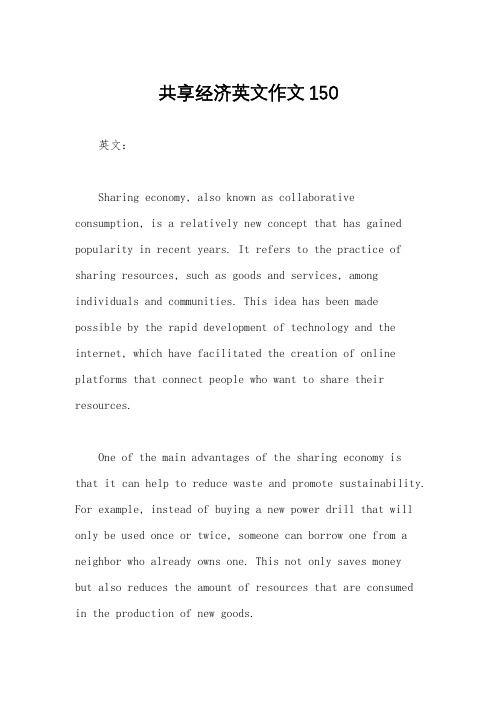
共享经济英文作文150英文:Sharing economy, also known as collaborative consumption, is a relatively new concept that has gained popularity in recent years. It refers to the practice of sharing resources, such as goods and services, among individuals and communities. This idea has been made possible by the rapid development of technology and the internet, which have facilitated the creation of online platforms that connect people who want to share their resources.One of the main advantages of the sharing economy isthat it can help to reduce waste and promote sustainability. For example, instead of buying a new power drill that will only be used once or twice, someone can borrow one from a neighbor who already owns one. This not only saves moneybut also reduces the amount of resources that are consumedin the production of new goods.Another benefit of the sharing economy is that it can create new opportunities for entrepreneurship and income generation. For instance, someone who owns a car can use it to provide ride-sharing services through platforms like Uber or Lyft. This allows them to earn extra income while also providing a valuable service to others.However, there are also some potential drawbacks to the sharing economy. One concern is that it may lead to the erosion of traditional industries and the loss of jobs. For example, the rise of Airbnb has disrupted the hotelindustry and has led to complaints from hotel workers who feel that their jobs are at risk.Another issue is that the sharing economy can sometimes be less reliable than traditional services. For example, if you rent a room through Airbnb, there is no guarantee that the room will be clean or that the host will be reliable. This can lead to a lack of trust and can make it difficult for some people to feel comfortable using these types of services.Overall, the sharing economy has the potential to bring about significant benefits, but it is important tocarefully consider the potential drawbacks as well.中文:共享经济,也称为协作消费,是近年来越来越受欢迎的一个相对较新的概念。
共享经济 英文作文
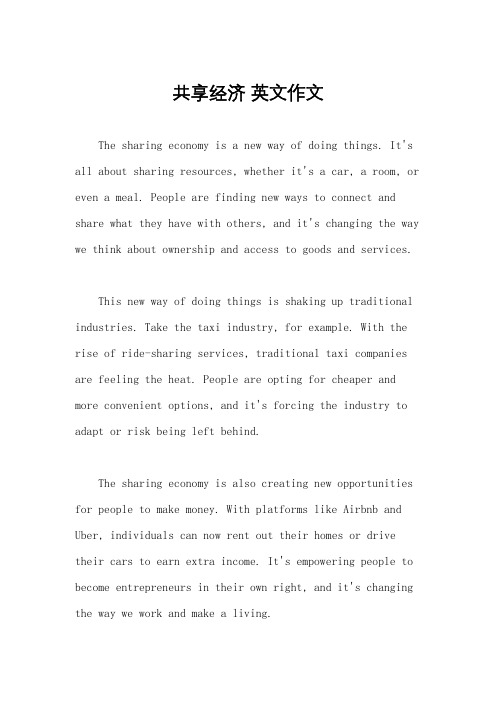
共享经济英文作文The sharing economy is a new way of doing things. It's all about sharing resources, whether it's a car, a room, or even a meal. People are finding new ways to connect and share what they have with others, and it's changing the way we think about ownership and access to goods and services.This new way of doing things is shaking up traditional industries. Take the taxi industry, for example. With the rise of ride-sharing services, traditional taxi companies are feeling the heat. People are opting for cheaper and more convenient options, and it's forcing the industry to adapt or risk being left behind.The sharing economy is also creating new opportunities for people to make money. With platforms like Airbnb and Uber, individuals can now rent out their homes or drive their cars to earn extra income. It's empowering people to become entrepreneurs in their own right, and it's changing the way we work and make a living.But the sharing economy isn't without its challenges. There are concerns about safety and regulation, especially when it comes to sharing assets like cars and homes.There's also the issue of fair compensation and laborrights for those participating in the sharing economy. It's a complex issue that requires careful consideration and thoughtful regulation.Despite the challenges, the sharing economy is here to stay. It's a reflection of our changing values andattitudes towards ownership and community. As technology continues to advance and connect us in new ways, thesharing economy will only continue to grow and evolve. It's an exciting time to be part of this new way of doing things.。
共享经济英语作文
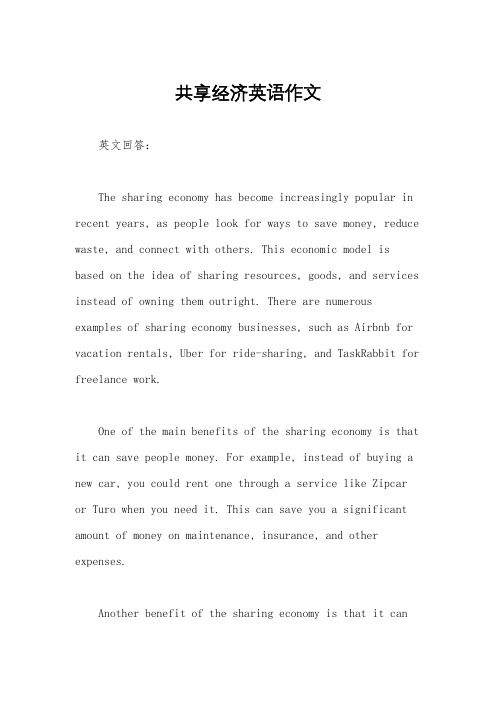
共享经济英语作文英文回答:The sharing economy has become increasingly popular in recent years, as people look for ways to save money, reduce waste, and connect with others. This economic model is based on the idea of sharing resources, goods, and services instead of owning them outright. There are numerous examples of sharing economy businesses, such as Airbnb for vacation rentals, Uber for ride-sharing, and TaskRabbit for freelance work.One of the main benefits of the sharing economy is that it can save people money. For example, instead of buying a new car, you could rent one through a service like Zipcar or Turo when you need it. This can save you a significant amount of money on maintenance, insurance, and other expenses.Another benefit of the sharing economy is that it canreduce waste. For example, instead of buying a new pair of skis for a weekend trip, you could rent them from a local shop. This helps to reduce the number of goods that are produced and disposed of, which can have a positive impact on the environment.Finally, the sharing economy can help to connect people. For example, Airbnb hosts often get to know their guestsand share local tips and recommendations. This can lead to new friendships, cultural exchange, and a sense of community.Of course, there are also some challenges associatedwith the sharing economy. One concern is that it can leadto a loss of privacy. For example, when you rent out your home on Airbnb, you are inviting strangers into your personal space. It is important to be aware of the risksand take steps to protect your privacy, such as screening guests carefully and using a security camera.Another challenge is that the sharing economy can sometimes lead to unfair competition. For example, Uberdrivers are not subject to the same regulations as taxi drivers, which can give them an unfair advantage. This can lead to a decline in the quality of service and lower wages for taxi drivers.Overall, the sharing economy has the potential to offer a number of benefits, including cost savings, reduced waste, and increased social connections. However, it is importantto be aware of the challenges and take steps to mitigate them.中文回答:共享经济近年来变得越来越流行,因为人们正在寻找省钱、减少浪费和与他人建立联系的方法。
共享经济英语六级作文
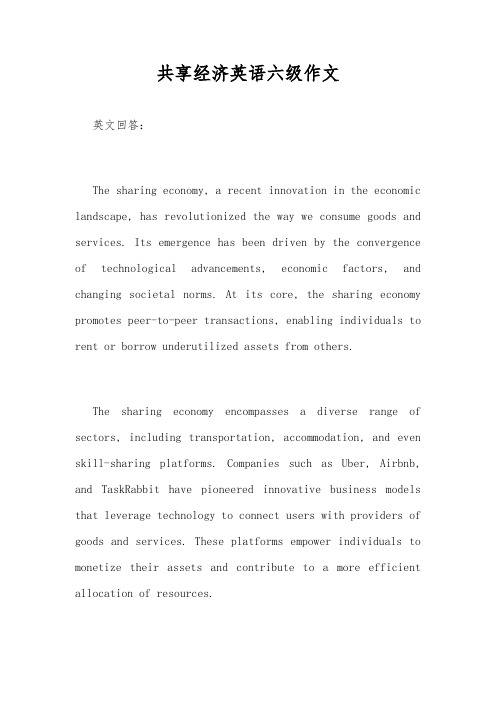
共享经济英语六级作文英文回答:The sharing economy, a recent innovation in the economic landscape, has revolutionized the way we consume goods and services. Its emergence has been driven by the convergence of technological advancements, economic factors, and changing societal norms. At its core, the sharing economy promotes peer-to-peer transactions, enabling individuals to rent or borrow underutilized assets from others.The sharing economy encompasses a diverse range of sectors, including transportation, accommodation, and even skill-sharing platforms. Companies such as Uber, Airbnb, and TaskRabbit have pioneered innovative business models that leverage technology to connect users with providers of goods and services. These platforms empower individuals to monetize their assets and contribute to a more efficient allocation of resources.One of the primary benefits of the sharing economy is its potential to reduce consumption and promote sustainability. By encouraging reuse and redistribution, the sharing economy helps mitigate waste and reduces the environmental impact associated with excessive consumption. Additionally, it fosters a sense of community and collaboration, bringing people together to share resources and knowledge.However, the sharing economy is not without its challenges. Concerns have been raised regarding labor regulations, safety, and data privacy. The need for effective regulation to ensure fair treatment of workers and protect consumers' interests has become increasingly apparent. Additionally, addressing issues related to liability and insurance in the context of shared assets remains an ongoing challenge.中文回答:共享经济作为经济领域的一项新兴创新,彻底改变了我们消费商品和服务的方式。
经济共享的英语作文

经济共享的英语作文In the modern world, the concept of economic sharing has become increasingly prevalent, transforming the way we think about resources and their distribution. Here's a composition that delves into the essence of economic sharing:The Rise of Economic Sharing: A New Paradigm in Resource AllocationIn an era where technology has made it possible to connect people across the globe, the idea of economic sharing has emerged as a powerful tool for resource optimization and distribution. This essay explores the implications of economic sharing and how it is reshaping our societies.Defining Economic SharingEconomic sharing refers to the practice of distributing resources, services, and profits among a community or a group of individuals. It is based on the principle of collective ownership and mutual benefit, where the focus is on accessibility and sustainability rather than individual ownership.The Impact on Traditional EconomiesTraditional economies are built on the premise of individual ownership and competition. Economic sharing challenges this by promoting collaboration and communal benefits. For instance, the rise of the sharing economy, where serviceslike Uber and Airbnb allow individuals to share their cars and homes, has disrupted traditional business models and created new opportunities for income generation.Technological EnablersTechnology plays a crucial role in facilitating economic sharing. Platforms that use blockchain for secure transactions, mobile applications for easy access, and data analytics for efficient resource management are some of the technological advancements that have made economic sharing viable and efficient.Environmental BenefitsOne of the most significant advantages of economic sharing is its potential to reduce waste and promote sustainability. By sharing resources, we can minimize the need for production and consumption, leading to a decrease in environmental impact. For example, car-sharing services reduce the number of vehicles on the road, thereby lowering carbon emissions.Challenges and ConcernsDespite its benefits, economic sharing also faces challenges. Issues such as privacy concerns, the displacement of traditional jobs, and the regulation of shared resources aresome of the concerns that need to be addressed. Moreover, the equitable distribution of profits and the fair treatment of all stakeholders are ongoing debates in the field of economic sharing.The Future of Economic SharingAs we move forward, it is essential to find a balance between the benefits of economic sharing and the challenges it presents. The future of economic sharing lies in its ability to adapt to societal needs, integrate with existing economic structures, and evolve with technological advancements.ConclusionEconomic sharing is not just a trend; it is a movement that reflects a shift in societal values towards a more inclusive and sustainable way of life. By embracing the principles of economic sharing, we can work towards a future where resources are used efficiently, and opportunities are shared equitably among all members of society.This composition provides a comprehensive overview of the concept of economic sharing, its impact, the role of technology, the environmental benefits, the challenges faced, and the future prospects of this emerging economic model.。
共享经济作文英文
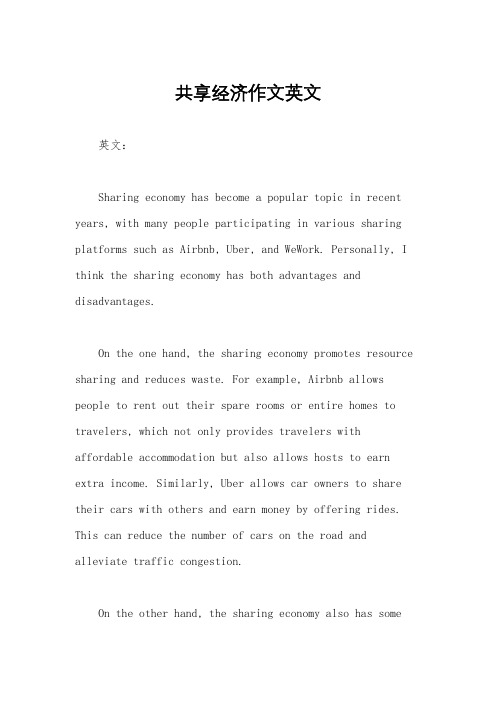
共享经济作文英文英文:Sharing economy has become a popular topic in recent years, with many people participating in various sharing platforms such as Airbnb, Uber, and WeWork. Personally, I think the sharing economy has both advantages and disadvantages.On the one hand, the sharing economy promotes resource sharing and reduces waste. For example, Airbnb allows people to rent out their spare rooms or entire homes to travelers, which not only provides travelers with affordable accommodation but also allows hosts to earn extra income. Similarly, Uber allows car owners to share their cars with others and earn money by offering rides. This can reduce the number of cars on the road and alleviate traffic congestion.On the other hand, the sharing economy also has somedrawbacks. For example, it may lead to increasedcompetition and decreased job security for traditional service providers. Additionally, there may be safety concerns with sharing services, such as the lack of insurance coverage or background checks for hosts and drivers.Overall, I believe that the sharing economy has the potential to bring many benefits, but it also needs to be regulated to ensure the safety and fairness of all participants.中文:近年来,共享经济已成为热门话题,许多人参与了各种共享平台,如Airbnb、Uber和WeWork。
共享经济外文翻译文献编辑

共享经济外⽂翻译⽂献编辑⽂献信息:⽂献标题:Putting the sharing economy into perspective(透视共享经济)国外作者:Koen Frenken,Juliet Schor⽂献出处:《Environmental Innovation and Societal Transitions》, 2017, 23:3-10字数统计:英⽂3345单词,18027字符;中⽂5823汉字外⽂⽂献:Putting the sharing economy into perspective Abstract We develop a conceptual framework that allows us to define the sharing economy and its close cousins and we understand its sudden rise from an economic-historic perspective. We then assess the sharing economy platforms in terms of the economic, social and environmental impacts. We end with reflections on current regulations and future alternatives, and suggest a number of future research questions.Keywords:Sharing; Platform; Sustainability; Reverse technology assessment; Regulation1.IntroductionIn the Spring of 2014, the sharing economy held an unusual gathering in San Francisco, a sort of “coming out” party. Entitled “SHARE,” the conference included not only founders, funders and fans of the sharing economy, but also harsh critics. Politically progressive insiders and outsiders raised questions about access, exclusion and the distribution of value in the sector. They discussed their vision of a fairer, lower-carbon, more transparent, participatory and socially-connected economy, and whether those goals are consistent with the actions of the large, moneyed players—the successful platforms and the venture capitalists who are backing them with vast sumsof finance. More recently, a key figure from the French sharing economy think thank OuiShare even stated at their annual conference in Paris that “the sharing economy is over” as it did not live up its initial promises (De Grave, 2016).It is clear that the sharing economy is creating enormous amounts of wealth, and that it has been using a sociallyprogressive feel-good rhetoric to do so. But will the platforms share that wealth with users—on both the provider and user sides of the market? Will the platforms ensure widespread access—by expanding their user base beyond the mostly white, highly educated, able-bodied urbanites who have comprised the bulk of users in the first stage? Will they make good on their promises to provide decent livelihoods for providers, opportunities for so-called “micro-entrepreneurs” and will they continue to provide real value to customers? Or is the rhetoric merely a thin veneer to hide a predatory business model that will ultimately appropriate value to investors and founders, once the market develops and users are locked into the platforms? Will the platforms behave like the monopolies that some seem poised to become? While it’s too early for de finitive answers to answer these questions, we believe it is crucial we start asking them in a more analytical, empirical and critical manner. Our aim with this paper is to put the sharing economy into perspective by providing a conceptual framework that allows us to define the sharing economy and its close cousins and to understand its sudden rise from an economic-historic perspective (Section 2), to assess sharing economy platforms in terms of the economic, social and environmental impacts (Section 3), and to reflect on current regulations and possible alternative platform architectures (Section 4). We end with some research questions for future research (Section 5).2.Definitional issuesThe notion of sharing of idle capacity is central to the definition of sharing economy, because it distinguishes the practice of sharing of goods from the practice of on-demand personal services. There is a fundamental difference between ordering a taxi through Uber, Lyft or Didi and sharing a ride through BlaBlaCar or anotherhitchhiking or carpooling platform (Meelen and Frenken, 2015). In the case of a taxi service, the consumer creates new capacity by ordering a taxi on demand to drive the passenger from A to B. Without the order, the trip would not have been made in the first place. In this case, the term now coming into common use is the on-demand economy. By contrast, in the case of hitchhiking/carpooling, the consumer occupies a seat that would otherwise not have been used as the driver had planned to go from A to B anyway. Hitchhiking and carpooling are examples of ride-sharing and part of the sharing economy (Benkler, 2004). Indeed, in the context of transportation, this distinction between on-demand economy and sharing economy has become clearer over time as mostcommentators now call Uber, Lyft and Didi ride-hailing companies instead of ride-sharing.The notion of under-utilization is also key to the current discussion about home sharing platforms such as Airbnb. When ahouse owner is away for holidays or a business trip, or has a spare bedroom, the asset is not utilized. That is, the unoccupied house can be considered as temporary idle capacity. If, however, a person were to buy a second home and rent it out to tourists permanently, that constitutes running a commercial lodging site, such as a B&B or hotel.Based on this definition, the sharing economy can be distinguished from three other types of platforms that are sharing economy examples pre-dating the Internet. In Fig. 1, the sharing economy is placed in the centre as it adheres to the three defining characteristics: consumer-to-consumer interaction (c2c), temporary access and physical goods.Fig. 1. Sharing economy and related forms of platform economy Consumers selling goods to each other is called the second-hand economy. This does not fall under the sharing economy as consumers grant each other permanent access, rather than temporary access to their goods. Large platforms intermediating such transactions are Ebay and Taobao. There are also platforms where people give away goods to each other, withoutpayment (including Facebook groups). This would also fall under the category of consumers who grant another permanent access. Renting goods from a company rather than from another consumer we call the product-service economy. The service provided by the company consists of giving the consumer access to a product while the company retains ownership of it. Once the product has been used and returned, it becomes available again for another renter. An example is a car rental service such as Hertz. Finally, if we are dealing with p2p service delivery instead of p2p good sharing, the term on-demand economy is used. More recently, commentators in th is context also tend to speak of the “gig economy”. The on-demand or gig economy includes purchasing personal services such as a ride, a handyman or a cooked meal.The definition that we use for sharing economy platforms, and the three other types of platforms that can be distinguished from it, accommodates the notion of sharing as a historical practice. Before the arrival of Internet platforms, people were already lending or renting out goods to others. They shared with family and friendsbecause were known and trusted social contacts. What is new is that users now also lend goods to strangers, because the Internet has enormously decreased transaction costs between unknown others. By transaction costs, economists mean all the costs and trouble incurred in making an economic transaction (Williamson, 1981). This refers especially to the costs related to search and arranging a contract. Among strangers, these were high before the advent of the Internet, as there was little information available about supply, reliability and contract forms (Benkler, 2004). This is one reason why sharing was generally limited to a circle of friends and family. As a result of Internet platforms, the costs of the search and the contract have become much lower. Consumers now find it much easier to locate goods and services they want, and transactions are regularized via standard contracts and online payment systems. In addition, on most sharing-economy platforms information on the past behaviour and therefore trustworthiness of users is elicited as a regular feature of transactions. This further lowers transaction costs and lowers risk.3.Assessing the sharing economyThe direct economic effects of the sharing economy are indisputably positive. People who voluntarily enter into a transaction in the sharing economy only do so if it is beneficial to both parties. Even in the case of goods lending there is a benefit: there are few costs for the lender because the person did not need the product during the lending period, whereas the borrower gains access to the product without charge. The rise in income or consumer welfare can be understood as a direct consequence of lower transaction costs. Millions of transactions now take place that did not happen in the past, because the transaction costs involved in stranger sharing were simply too high (Benkler, 2004).Yet, the full economic effects are far more complex. First, the rise of p2p sharing markets will have indirect effects on other markets. For example, legacy businesses and their workers in related markets are likely to experience lower earnings. One study found that hotel earnings in Texas declined significantly in places where Airbnb grew (Zervas et al., 2016). Further analysis also showed that the impacts were unevenacross the industry, with lower-end hotels and hotels not catering to business travellers being the most affected. This indicates that Airbnb is a partial substitute for hotel nights, especially in the cheaper segments of the hotel market. The same effect may be expected in the market for car rentals which now face increased competition due to the rise of p2p carsharing platforms. There are also potentially effects on the supply and price of housing, if home sharing becomes more widespread. This would mean that residents see their rents go up in neighbourhoods where home sharing is popular.Second, there are externalities as third parties may experience losses as the two parties transact. This is especially a problem with house sharing with neighbours experiencing nuisance and feelings of danger from strangers. Increasingly, neighbourhoods have attempted to stop the further growth of home sharing in tourist cities like Amsterdam, Barcelona, Berlin, New York and Paris. In response, municipalities are tightening their regulations towards home sharing platforms (Woolf, 2016).The environmental effects associated with the sharing sector are also complex. Many platforms advertise themselves asgreen, and particularly as carbon-footprint reducing. It is also a common belief among participants that sharing is less resource intensive (Schor and Wengronowitz, 2017). Sharing is thought to be eco-friendly because it is assumed to reduce the demand for new goods or the construction of new facilities (in the case of hotels or shared spaces). Despite these widespread beliefs, there is not yet empirical evidence on these claims, apart from car sharing where substantial reductions in CO2-emissions are realized (Chen and Kockelman, 2015; Nijland and Van Meerkerk, 2015). The standard argument on eco-impacts addresses substitutions among types of goods or services that have different technologies. This type of reasoning is what economists call partial-equilibrium analysis, which only looks at first round effects. To determine full carbon and eco-impacts it is also necessary to analyze all the changes that are set in motion in the system as a result of a new sharing practice (Schor, 2014; Frenken, 2017). For example, if the sale of a household’s used items creates earnings that are then used to buy new goods (“rebound effect”), the original sale may not reduce carbon emissions or other environmental impacts. Another second round impact can occur if sharing practices shift income across classes, because eco-impact per dollar of expenditure varies by income class.Regarding the social benefi ts, there is a widespread “common good” claim by a number of platforms, as well as participants on both sides of the market which is the benefit of meeting people, making friends and getting to know others (Fitzmaurice et al., 2016). Schor (2015a) finds that the site that has been most successful at creating new social ties is Airbnb. Findings from one small interview study are that for half the Airbnb hosts social interaction was central to their motivation and practice on the site. These hosts socialized with their guests, ate with them, took them out, and in some cases became friends with them.A small group reported that they would host even if they had all the money they needed, and a few offered their homes on both Airbnb and Couchsurfing, for which they received no money. This finding is in line B?cker and Meelen (2016) who find that people who state that they are willing to share their home, often have social motivations next to economic ones. Ladegaard (2016), using a Boston area sample, further qualifies these results showing that socially-oriented hosts are eager to interact with foreign guests who are “comfortably exotic,” i.e., different enough to be interesting, but similar enough to be comfortable.It is also possible that sharing platforms may be harmful to social cohesion as reflected in existing social ties. Platforms economize private things in the sense that at any time these stand idle, an opportunity cost arises. This in itself does not affect social relations. However, while idle capacity was generally available to family and friends for free in the past, researchers and commentators have expressed concern about the viability of non-monetized sharing within networks as people prefer earning money (Belk, 2014; Schor, 2015b). Standard economic analysis suggests this will happen, although does not offer a prediction on how large this effect will be. There is only anecdotal evidence on this issue at the moment. For example, one Airbnb host said he will now require his friends and relatives to transact with him via the platform, to insure against damage to his apartment and possessions (Ravenelle, 2016). Another host reported being unhappy about having her in-laws stay for an extended periodbecause of the money she lost (Schor, 2015b). In these studies, however, the prevalence of crowding out of altruistic sharing thus far appears to be low.In all, the economic, social and environmental effects of sharing economy platforms are largely unknown. While the direct economic benefits are obvious from the large volume of monetary transactions taking place, the distributional effects may be quite skewed. Since the bulk of revenue in the sharing economy accrues via home sharing, already well-off home owners will profit most. Environmental benefits mostly lie in car and ridesharing, and the overall effects of sharing economy platforms may be small due to rebound effects. Finally, social effects are complex and not necessarily inclusive.4.AlternativesDespite the call for scientific assessments of the sustainability impacts of sharing economy platforms, we should acknowledge that the precise impacts are likely to remain unclear for a long time to come. The reason for the lasting gap in our knowledge is not only theoretical, but also empirical. For a proper assessment of the impacts, access to the user data currently held by platforms is key. However, the platforms have been restrictive and selective in granting researchers access to their user data, citing privacy and competition concerns. Instead, platforms release their own research results (e.g., Airbnb, 2014), which tend to emphasize the direct benefits without much consideration of the more complex and indirect effects just discussed.In this context, it has been noted that the social process of assessing the desirability of sharing platforms follows a reverse logic. Frenken (2016) speaks of “reverse technology assessment” in this context. In many countries, established sectors like food, drugs, transportation, construction, and children’s toys are subject to detailed scientific analysis and normative deliberation before new products are allowed to enter the market. Sharing economy platforms, by contrast, are introduced onto the market without consultation, and due to their fast growth they prompt ad-hoc government action without much evidentiary basis. This reverse process has advantages, as users “vote with their feet” and provide individual platforms with practical legitimacy. However, these users are likely to be less affected by externalities and second and third round effects. Given the recent backlash and opposition to particular platforms from various social groups, more systematic evidence isneeded to resolve the current debate, with more room for nuanced opinions by independent actors (e.g., academics, journalists, consumer organizations, etc.).Restricted access to user data also hampers the enforcement of regulations and, consequently, policy evaluation. Though the advent of sharing-economy platforms is recent, the volume of activity on some of these platforms is already sizeable and still growing exponentially. Understandably, calls for regulations are getting louder given the negative externalities caused by home sharing and unfair competition between platform and traditional operators in sectors like tourism, restaurants, short-stay, transport, and appliances. What is more, there is reason to assume that many avoid paying taxes or are not even aware that taxes should be paid for some activities (especially home sharing).The typical response of regulators has been to create institutional boundaries between the sharing economy and the regular economy by putting a cap on a sharing activity. For example, an increasing number of cities allow home sharing for a fixed number of days (e.g., 30, 60 or 90 days). This “cap” logic can be applied to operators of home restaurants and owners of boats, campers, and parking spaces. The principle of a cap is consistent with our definition of sharing economy as consumers who grant each other temporary access to their under-utilized goods, as it avoids cases where people purchase goods or houses for the purpose of renting them out on a permanent basis. With caps, governments solve two problems at once because they meet the incumbent businesses halfway by creating clear boundaries between professional providers and incidental providers, and they “solve” the tax avoidance practice by users pragmatically as the sums gained by incidental providers are small enough that they can be ignored or otherwise fall under existing tax exemption levels (except for home sharing where revenues are quite skewed and the foregone tax revenues are sizeable). This logic of containment is sustainableas long as the caps can beeffectively monitored. Currently, however, governments struggle to enforce such rules, since the platforms do not give them access to user data as they are protected under current privacy laws, while alternative ways of monitoring do not outweigh the costs involved. The government, thus, follows a cap logic which may turn out to hard to enforce in practice. In all, current governmental institutions have not yet come up with an adequate and credible response to the concerns of incumbent business interests and the unions.Against this background, it is not surprising that to see various alternative platforms being founded. Serious experiments are emerging ranging from cooperative-based and crowdfunded platforms to platforms that make use of alternative currencies or more novel block-chain technology (Scholz, 2014; Scholz and Schneider, 2016). At the same time, some of the existing commercial platforms are now changing the ways in which they engage with users and governments, and are looking for workarounds to help with enforcement their regulations.5.A research agendaFrom our discussion of the delineation of the sharing economy from other platform economies, and our assessment of its impacts and alternatives, we distill a number of research questions. These questions focus on the varieties of platforms in terms of their governance, scalability and impacts.(1)What types of sharing economies have historically existed across cultures and epochs, and what can we learn from the economics, governance and impacts of such initiatives and practices in the light of current day sharing economy platforms?(2)What is the relative importance of trust-generating mechanisms on sharing economy platforms, including past ratings, personal identification, online communication and extra-platform reputational capital?(3)How can we analytically conceptualize and empirically assess the various impacts of the current sharing economy platforms in terms of people, planet and prosperity? To what extent can we carry out such assessment without access to user data?(4)How can we explain and evaluate the variety of regulatory responses of governments at local, national and supra-national levels as well as the modes of self-governance employed by platforms?(5)What alternative governance schemes for operating a platform are currently being employed? How can we explain their emergence, growth and relative success across sectors, territories and social groups?Finding answers to these questions will be a challenging endeavour. It will require a range of disciplinary perspectives and methodological approaches and a close eye for historical contexts and geographical specificities. Despite the strong rhetoric of proponents and criticasters alike, the future of the sharing economy is fundamentally open and contingent. In this, clearly, academics have their role to play.中⽂译⽂:透视共享经济摘要我们建⽴了⼀个概念框架,使我们能够定义共享经济及其近亲,并从经济历史的⾓度理解它的突然崛起。
关于共享经济英文作文
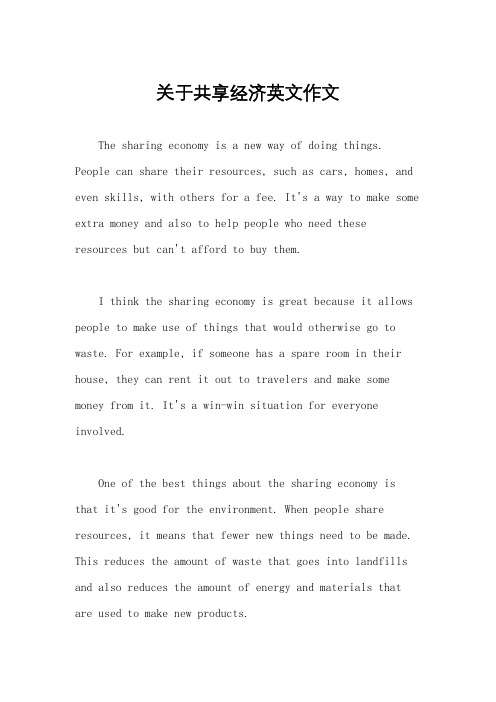
关于共享经济英文作文The sharing economy is a new way of doing things. People can share their resources, such as cars, homes, and even skills, with others for a fee. It's a way to make some extra money and also to help people who need these resources but can't afford to buy them.I think the sharing economy is great because it allows people to make use of things that would otherwise go to waste. For example, if someone has a spare room in their house, they can rent it out to travelers and make some money from it. It's a win-win situation for everyone involved.One of the best things about the sharing economy isthat it's good for the environment. When people share resources, it means that fewer new things need to be made. This reduces the amount of waste that goes into landfills and also reduces the amount of energy and materials that are used to make new products.Some people are worried that the sharing economy will lead to a decrease in traditional jobs. They think that if people can share resources, then they won't need to buy as many new things, which will hurt traditional businesses. However, I think that the sharing economy can actually create new opportunities for people to make money, such as by renting out their own resources or by providing services to others.Overall, I believe that the sharing economy is a positive development. It allows people to make use of resources that would otherwise go to waste, it's good for the environment, and it can create new opportunities for people to make money. It's a new way of doing things that has the potential to benefit everyone involved.。
英文作文共享经济
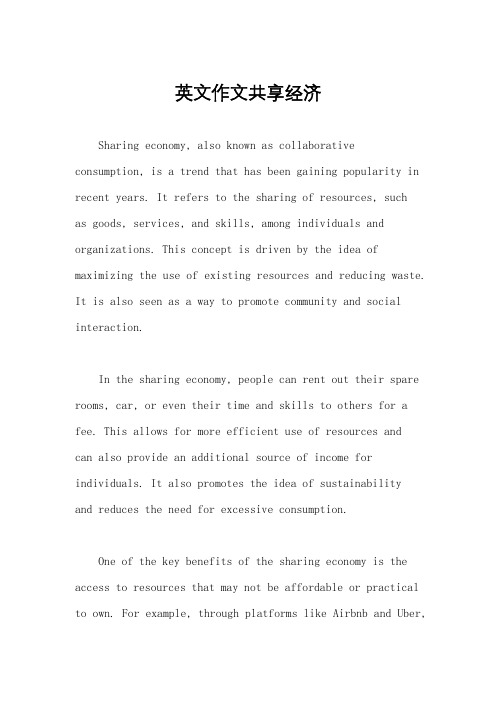
英文作文共享经济Sharing economy, also known as collaborative consumption, is a trend that has been gaining popularity in recent years. It refers to the sharing of resources, suchas goods, services, and skills, among individuals and organizations. This concept is driven by the idea of maximizing the use of existing resources and reducing waste. It is also seen as a way to promote community and social interaction.In the sharing economy, people can rent out their spare rooms, car, or even their time and skills to others for a fee. This allows for more efficient use of resources andcan also provide an additional source of income for individuals. It also promotes the idea of sustainabilityand reduces the need for excessive consumption.One of the key benefits of the sharing economy is the access to resources that may not be affordable or practical to own. For example, through platforms like Airbnb and Uber,people can access accommodation and transportation at a lower cost than traditional options. This can be especially beneficial for those on a tight budget or in need of temporary solutions.The sharing economy has also given rise to new business models and opportunities. Start-ups and entrepreneurs have been able to create platforms and apps that facilitate the sharing of resources, leading to the growth of the gig economy. This has provided flexibility and opportunitiesfor individuals to earn income on their own terms.However, the sharing economy is not without its challenges. There are concerns about the lack of regulation and oversight, which can lead to issues such as safety and security risks. There are also questions about the impact on traditional industries and the potential forexploitation of workers in the gig economy.Overall, the sharing economy has the potential to bring about positive change in how resources are used and distributed. It offers opportunities for individuals toconnect, collaborate, and make the most of available resources. As it continues to evolve, it will be important to address the challenges and ensure that it benefits both individuals and society as a whole.。
- 1、下载文档前请自行甄别文档内容的完整性,平台不提供额外的编辑、内容补充、找答案等附加服务。
- 2、"仅部分预览"的文档,不可在线预览部分如存在完整性等问题,可反馈申请退款(可完整预览的文档不适用该条件!)。
- 3、如文档侵犯您的权益,请联系客服反馈,我们会尽快为您处理(人工客服工作时间:9:00-18:30)。
文献信息:文献标题:Putting the sharing economy into perspective(透视共享经济)国外作者:Koen Frenken,Juliet Schor文献出处:《Environmental Innovation and Societal Transitions》, 2017, 23:3-10字数统计:英文3345单词,18027字符;中文5823汉字外文文献:Putting the sharing economy into perspective Abstract We develop a conceptual framework that allows us to define the sharing economy and its close cousins and we understand its sudden rise from an economic-historic perspective. We then assess the sharing economy platforms in terms of the economic, social and environmental impacts. We end with reflections on current regulations and future alternatives, and suggest a number of future research questions.Keywords:Sharing; Platform; Sustainability; Reverse technology assessment; Regulation1.IntroductionIn the Spring of 2014, the sharing economy held an unusual gathering in San Francisco, a sort of “coming out” party. Entitled “SHARE,” the conference included not only founders, funders and fans of the sharing economy, but also harsh critics. Politically progressive insiders and outsiders raised questions about access, exclusion and the distribution of value in the sector. They discussed their vision of a fairer, lower-carbon, more transparent, participatory and socially-connected economy, and whether those goals are consistent with the actions of the large, moneyed players—the successful platforms and the venture capitalists who are backing them with vast sumsof finance. More recently, a key figure from the French sharing economy think thank OuiShare even stated at their annual conference in Paris that “the sharing economy is over” as it did not live up its initial promises (De Grave, 2016).It is clear that the sharing economy is creating enormous amounts of wealth, and that it has been using a sociallyprogressive feel-good rhetoric to do so. But will the platforms share that wealth with users—on both the provider and user sides of the market? Will the platforms ensure widespread access—by expanding their user base beyond the mostly white, highly educated, able-bodied urbanites who have comprised the bulk of users in the first stage? Will they make good on their promises to provide decent livelihoods for providers, opportunities for so-called “micro-entrepreneurs” and will they continue to provide real value to customers? Or is the rhetoric merely a thin veneer to hide a predatory business model that will ultimately appropriate value to investors and founders, once the market develops and users are locked into the platforms? Will the platforms behave like the monopolies that some seem poised to become? While it’s too early for definitive answers to answer these questions, we believe it is crucial we start asking them in a more analytical, empirical and critical manner.Our aim with this paper is to put the sharing economy into perspective by providing a conceptual framework that allows us to define the sharing economy and its close cousins and to understand its sudden rise from an economic-historic perspective (Section 2), to assess sharing economy platforms in terms of the economic, social and environmental impacts (Section 3), and to reflect on current regulations and possible alternative platform architectures (Section 4). We end with some research questions for future research (Section 5).2.Definitional issuesThe notion of sharing of idle capacity is central to the definition of sharing economy, because it distinguishes the practice of sharing of goods from the practice of on-demand personal services. There is a fundamental difference between ordering a taxi through Uber, Lyft or Didi and sharing a ride through BlaBlaCar or anotherhitchhiking or carpooling platform (Meelen and Frenken, 2015). In the case of a taxi service, the consumer creates new capacity by ordering a taxi on demand to drive the passenger from A to B. Without the order, the trip would not have been made in the first place. In this case, the term now coming into common use is the on-demand economy. By contrast, in the case of hitchhiking/carpooling, the consumer occupies a seat that would otherwise not have been used as the driver had planned to go from A to B anyway. Hitchhiking and carpooling are examples of ride-sharing and part of the sharing economy (Benkler, 2004). Indeed, in the context of transportation, this distinction between on-demand economy and sharing economy has become clearer over time as most commentators now call Uber, Lyft and Didi ride-hailing companies instead of ride-sharing.The notion of under-utilization is also key to the current discussion about home sharing platforms such as Airbnb. When a house owner is away for holidays or a business trip, or has a spare bedroom, the asset is not utilized. That is, the unoccupied house can be considered as temporary idle capacity. If, however, a person were to buy a second home and rent it out to tourists permanently, that constitutes running a commercial lodging site, such as a B&B or hotel.Based on this definition, the sharing economy can be distinguished from three other types of platforms that are sharing economy examples pre-dating the Internet. In Fig. 1, the sharing economy is placed in the centre as it adheres to the three defining characteristics: consumer-to-consumer interaction (c2c), temporary access and physical goods.Fig. 1. Sharing economy and related forms of platform economy Consumers selling goods to each other is called the second-hand economy. This does not fall under the sharing economy as consumers grant each other permanent access, rather than temporary access to their goods. Large platforms intermediating such transactions are Ebay and Taobao. There are also platforms where people give away goods to each other, without payment (including Facebook groups). This would also fall under the category of consumers who grant another permanent access. Renting goods from a company rather than from another consumer we call the product-service economy. The service provided by the company consists of giving the consumer access to a product while the company retains ownership of it. Once the product has been used and returned, it becomes available again for another renter. An example is a car rental service such as Hertz. Finally, if we are dealing with p2p service delivery instead of p2p good sharing, the term on-demand economy is used. More recently, commentators in this context also tend to speak of the “gig economy”. The on-demand or gig economy includes purchasing personal services such as a ride, a handyman or a cooked meal.The definition that we use for sharing economy platforms, and the three other types of platforms that can be distinguished from it, accommodates the notion of sharing as a historical practice. Before the arrival of Internet platforms, people were already lending or renting out goods to others. They shared with family and friendsbecause were known and trusted social contacts. What is new is that users now also lend goods to strangers, because the Internet has enormously decreased transaction costs between unknown others. By transaction costs, economists mean all the costs and trouble incurred in making an economic transaction (Williamson, 1981). This refers especially to the costs related to search and arranging a contract. Among strangers, these were high before the advent of the Internet, as there was little information available about supply, reliability and contract forms (Benkler, 2004). This is one reason why sharing was generally limited to a circle of friends and family. As a result of Internet platforms, the costs of the search and the contract have become much lower. Consumers now find it much easier to locate goods and services they want, and transactions are regularized via standard contracts and online payment systems. In addition, on most sharing-economy platforms information on the past behaviour and therefore trustworthiness of users is elicited as a regular feature of transactions. This further lowers transaction costs and lowers risk.3.Assessing the sharing economyThe direct economic effects of the sharing economy are indisputably positive. People who voluntarily enter into a transaction in the sharing economy only do so if it is beneficial to both parties. Even in the case of goods lending there is a benefit: there are few costs for the lender because the person did not need the product during the lending period, whereas the borrower gains access to the product without charge. The rise in income or consumer welfare can be understood as a direct consequence of lower transaction costs. Millions of transactions now take place that did not happen in the past, because the transaction costs involved in stranger sharing were simply too high (Benkler, 2004).Yet, the full economic effects are far more complex. First, the rise of p2p sharing markets will have indirect effects on other markets. For example, legacy businesses and their workers in related markets are likely to experience lower earnings. One study found that hotel earnings in Texas declined significantly in places where Airbnb grew (Zervas et al., 2016). Further analysis also showed that the impacts were unevenacross the industry, with lower-end hotels and hotels not catering to business travellers being the most affected. This indicates that Airbnb is a partial substitute for hotel nights, especially in the cheaper segments of the hotel market. The same effect may be expected in the market for car rentals which now face increased competition due to the rise of p2p carsharing platforms. There are also potentially effects on the supply and price of housing, if home sharing becomes more widespread. This would mean that residents see their rents go up in neighbourhoods where home sharing is popular.Second, there are externalities as third parties may experience losses as the two parties transact. This is especially a problem with house sharing with neighbours experiencing nuisance and feelings of danger from strangers. Increasingly, neighbourhoods have attempted to stop the further growth of home sharing in tourist cities like Amsterdam, Barcelona, Berlin, New York and Paris. In response, municipalities are tightening their regulations towards home sharing platforms (Woolf, 2016).The environmental effects associated with the sharing sector are also complex. Many platforms advertise themselves as green, and particularly as carbon-footprint reducing. It is also a common belief among participants that sharing is less resource intensive (Schor and Wengronowitz, 2017). Sharing is thought to be eco-friendly because it is assumed to reduce the demand for new goods or the construction of new facilities (in the case of hotels or shared spaces). Despite these widespread beliefs, there is not yet empirical evidence on these claims, apart from car sharing where substantial reductions in CO2-emissions are realized (Chen and Kockelman, 2015; Nijland and Van Meerkerk, 2015). The standard argument on eco-impacts addresses substitutions among types of goods or services that have different technologies. This type of reasoning is what economists call partial-equilibrium analysis, which only looks at first round effects. To determine full carbon and eco-impacts it is also necessary to analyze all the changes that are set in motion in the system as a result of a new sharing practice (Schor, 2014; Frenken, 2017). For example, if the sale of a household’s used items creates earnings that are then used to buy new goods(“rebound effect”), the original sale may not reduce carbon emissions or other environmental impacts. Another second round impact can occur if sharing practices shift income across classes, because eco-impact per dollar of expenditure varies by income class.Regarding the social benefits, there is a widespread “common good” claim by a number of platforms, as well as participants on both sides of the market which is the benefit of meeting people, making friends and getting to know others (Fitzmaurice et al., 2016). Schor (2015a) finds that the site that has been most successful at creating new social ties is Airbnb. Findings from one small interview study are that for half the Airbnb hosts social interaction was central to their motivation and practice on the site. These hosts socialized with their guests, ate with them, took them out, and in some cases became friends with them. A small group reported that they would host even if they had all the money they needed, and a few offered their homes on both Airbnb and Couchsurfing, for which they received no money. This finding is in line Böcker and Meelen (2016) who find that people who state that they are willing to share their home, often have social motivations next to economic ones. Ladegaard (2016), using a Boston area sample, further qualifies these results showing that socially-oriented hosts are eager to interact with foreign guests who are “comfortably exotic,” i.e., different enough to be interesting, but similar enough to be comfortable.It is also possible that sharing platforms may be harmful to social cohesion as reflected in existing social ties. Platforms economize private things in the sense that at any time these stand idle, an opportunity cost arises. This in itself does not affect social relations. However, while idle capacity was generally available to family and friends for free in the past, researchers and commentators have expressed concern about the viability of non-monetized sharing within networks as people prefer earning money (Belk, 2014; Schor, 2015b). Standard economic analysis suggests this will happen, although does not offer a prediction on how large this effect will be. There is only anecdotal evidence on this issue at the moment. For example, one Airbnb host said he will now require his friends and relatives to transact with him via the platform, to insure against damage to his apartment and possessions (Ravenelle, 2016). Anotherhost reported being unhappy about having her in-laws stay for an extended period because of the money she lost (Schor, 2015b). In these studies, however, the prevalence of crowding out of altruistic sharing thus far appears to be low.In all, the economic, social and environmental effects of sharing economy platforms are largely unknown. While the direct economic benefits are obvious from the large volume of monetary transactions taking place, the distributional effects may be quite skewed. Since the bulk of revenue in the sharing economy accrues via home sharing, already well-off home owners will profit most. Environmental benefits mostly lie in car and ridesharing, and the overall effects of sharing economy platforms may be small due to rebound effects. Finally, social effects are complex and not necessarily inclusive.4.AlternativesDespite the call for scientific assessments of the sustainability impacts of sharing economy platforms, we should acknowledge that the precise impacts are likely to remain unclear for a long time to come. The reason for the lasting gap in our knowledge is not only theoretical, but also empirical. For a proper assessment of the impacts, access to the user data currently held by platforms is key. However, the platforms have been restrictive and selective in granting researchers access to their user data, citing privacy and competition concerns. Instead, platforms release their own research results (e.g., Airbnb, 2014), which tend to emphasize the direct benefits without much consideration of the more complex and indirect effects just discussed.In this context, it has been noted that the social process of assessing the desirability of sharing platforms follows a reverse logic. Frenken (2016) speaks of “reverse technology assessment” in this context. In many countries, established sectors like food, drugs, transportation, construction, and children’s toys are subject to detailed scientific analysis and normative deliberation before new products are allowed to enter the market. Sharing economy platforms, by contrast, are introduced onto the market without consultation, and due to their fast growth they prompt ad-hoc government action without much evidentiary basis. This reverse process hasadvantages, as users “vote with their feet” and provide individual platforms with practical legitimacy. However, these users are likely to be less affected by externalities and second and third round effects. Given the recent backlash and opposition to particular platforms from various social groups, more systematic evidence is needed to resolve the current debate, with more room for nuanced opinions by independent actors (e.g., academics, journalists, consumer organizations, etc.).Restricted access to user data also hampers the enforcement of regulations and, consequently, policy evaluation. Though the advent of sharing-economy platforms is recent, the volume of activity on some of these platforms is already sizeable and still growing exponentially. Understandably, calls for regulations are getting louder given the negative externalities caused by home sharing and unfair competition between platform and traditional operators in sectors like tourism, restaurants, short-stay, transport, and appliances. What is more, there is reason to assume that many avoid paying taxes or are not even aware that taxes should be paid for some activities (especially home sharing).The typical response of regulators has been to create institutional boundaries between the sharing economy and the regular economy by putting a cap on a sharing activity. For example, an increasing number of cities allow home sharing for a fixed number of days (e.g., 30, 60 or 90 days). This “cap” logic can be applied to operators of home restaurants and owners of boats, campers, and parking spaces. The principle of a cap is consistent with our definition of sharing economy as consumers who grant each other temporary access to their under-utilized goods, as it avoids cases where people purchase goods or houses for the purpose of renting them out on a permanent basis. With caps, governments solve two problems at once because they meet the incumbent businesses halfway by creating clear boundaries between professional providers and incidental providers, and they “solve” the tax avoidance practice by users pragmatically as the sums gained by incidental providers are small enough that they can be ignored or otherwise fall under existing tax exemption levels (except for home sharing where revenues are quite skewed and the foregone tax revenues aresizeable). This logic of containment is sustainable as long as the caps can be effectively monitored. Currently, however, governments struggle to enforce such rules, since the platforms do not give them access to user data as they are protected under current privacy laws, while alternative ways of monitoring do not outweigh the costs involved. The government, thus, follows a cap logic which may turn out to hard to enforce in practice. In all, current governmental institutions have not yet come up with an adequate and credible response to the concerns of incumbent business interests and the unions.Against this background, it is not surprising that to see various alternative platforms being founded. Serious experiments are emerging ranging from cooperative-based and crowdfunded platforms to platforms that make use of alternative currencies or more novel block-chain technology (Scholz, 2014; Scholz and Schneider, 2016). At the same time, some of the existing commercial platforms are now changing the ways in which they engage with users and governments, and are looking for workarounds to help with enforcement their regulations.5.A research agendaFrom our discussion of the delineation of the sharing economy from other platform economies, and our assessment of its impacts and alternatives, we distill a number of research questions. These questions focus on the varieties of platforms in terms of their governance, scalability and impacts.(1)What types of sharing economies have historically existed across cultures and epochs, and what can we learn from the economics, governance and impacts of such initiatives and practices in the light of current day sharing economy platforms?(2)What is the relative importance of trust-generating mechanisms on sharing economy platforms, including past ratings, personal identification, online communication and extra-platform reputational capital?(3)How can we analytically conceptualize and empirically assess the various impacts of the current sharing economy platforms in terms of people, planet and prosperity? To what extent can we carry out such assessment without access to userdata?(4)How can we explain and evaluate the variety of regulatory responses of governments at local, national and supra-national levels as well as the modes of self-governance employed by platforms?(5)What alternative governance schemes for operating a platform are currently being employed? How can we explain their emergence, growth and relative success across sectors, territories and social groups?Finding answers to these questions will be a challenging endeavour. It will require a range of disciplinary perspectives and methodological approaches and a close eye for historical contexts and geographical specificities. Despite the strong rhetoric of proponents and criticasters alike, the future of the sharing economy is fundamentally open and contingent. In this, clearly, academics have their role to play.中文译文:透视共享经济摘要我们建立了一个概念框架,使我们能够定义共享经济及其近亲,并从经济历史的角度理解它的突然崛起。
